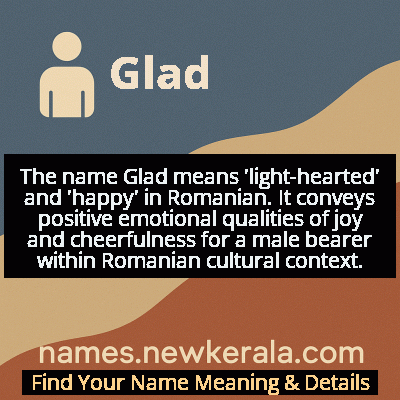Glad Name Meaning & Details
Origin, Popularity, Numerology Analysis & Name Meaning of Glad
Discover the origin, meaning, and cultural significance of the name GLAD. Delve into its historical roots and explore the lasting impact it has had on communities and traditions.
Name
Glad
Gender
Male
Origin
Romanian
Lucky Number
6
Meaning of the Name - Glad
The name Glad means 'light-hearted' and 'happy' in Romanian. It conveys positive emotional qualities of joy and cheerfulness for a male bearer within Romanian cultural context.
Glad - Complete Numerology Analysis
Your Numerology Number
Based on Pythagorean Numerology System
Ruling Planet
Venus
Positive Nature
Harmonious, responsible, caring, and artistic.
Negative Traits
Overly idealistic, superficial, possessive, or jealous.
Lucky Colours
Pink, turquoise.
Lucky Days
Friday.
Lucky Stones
Diamond, turquoise.
Harmony Numbers
2, 3, 9.
Best Suited Professions
Artists, musicians, teachers, healthcare workers.
What People Like About You
Warmth, nurturing nature, artistic flair.
Famous People Named Glad
Glad the Dacian
Historical Figure/Ruler
Led resistance against Hungarian expansion in the 9th-10th centuries
Glad Popa
Football Player
Professional footballer who played for multiple Romanian clubs
Glad Pătrașcu
Academic
Professor and researcher in engineering sciences
Name Variations & International Equivalents
Click on blue names to explore their detailed meanings. Gray names with will be available soon.
Cultural & Historical Significance
In contemporary Romanian culture, the name continues to carry this historical weight while also representing the positive emotional qualities of happiness and light-heartedness. This dual significance makes it a meaningful choice for families wishing to honor both their historical roots and their hopes for their child's character. The name serves as a bridge between ancient Dacian civilization and modern Romanian identity, maintaining cultural continuity while adapting to contemporary naming practices.
Extended Personality Analysis
Individuals named Glad typically exhibit a naturally optimistic and cheerful disposition, often serving as sources of positivity in their social circles. Their light-hearted nature is balanced by an underlying strength and resilience, likely influenced by the name's historical associations with leadership and resistance. This combination makes them both approachable and respected, able to maintain their joyful outlook even during challenging circumstances.
Beyond their evident happiness, Glads often demonstrate strong leadership qualities and a determined spirit. They possess the ability to inspire others through both their positive energy and their steadfast commitment to their principles. Their personality represents the ideal balance between emotional warmth and inner strength, showing that genuine happiness often requires courage and perseverance. This makes them effective in both personal relationships and professional settings where both optimism and reliability are valued.
Modern Usage & Popularity
In modern Romania, the name Glad maintains a distinctive presence, primarily chosen by families seeking to honor historical heritage while expressing positive emotional aspirations for their children. While not ranking among the most popular contemporary names, it enjoys consistent usage particularly in regions with strong connections to Dacian history, such as western Romania and areas near historical Dacian settlements. The name has experienced a modest resurgence in recent decades as Romanian parents increasingly look to their national history for naming inspiration, though it remains relatively uncommon compared to more traditional Romanian names. Modern usage often pairs Glad with conventional middle names, creating a balance between historical significance and contemporary practicality.
Symbolic & Spiritual Meanings
Symbolically, Glad represents the powerful combination of joy and resilience, embodying the philosophical idea that true happiness requires inner strength and the courage to maintain optimism during adversity. The name carries rich metaphorical meaning, suggesting that light-heartedness is not merely emotional lightness but a conscious choice to find joy despite challenges. It symbolizes cultural endurance through its connection to Dacian history while simultaneously representing universal human aspirations for happiness and contentment. The name serves as a reminder that maintaining a positive spirit can be an act of resistance against life's difficulties, and that joy itself can be a form of strength that preserves cultural identity and personal integrity.

